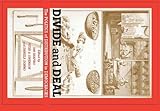Divide and Deal : The Politics of Distribution in Democracies / ed. by Daniela Donno Panayides, Ian Shapiro, Peter A. Swenson.
Material type: TextPublisher: New York, NY : New York University Press, [2008]Copyright date: ©2008Description: 1 online resourceContent type:
TextPublisher: New York, NY : New York University Press, [2008]Copyright date: ©2008Description: 1 online resourceContent type: - 9780814708835
- Democracy -- Economic aspects
- Distribution (Economic theory) -- Political aspects
- Distributive justice
- Income distribution -- Political aspects
- POLITICAL SCIENCE / Political ideologies / Democracy
- Taking
- broad
- coalitions
- contribute
- distribution
- distributive
- encompassing
- explores
- individuals
- inequality
- institutions
- often
- politics
- risk
- status
- surprising
- this
- turns
- twists
- view
- volume
- wealth
- well-being
- 339.2
- HC79.I5 D58 2008
- online - DeGruyter
| Item type | Current library | Call number | URL | Status | Notes | Barcode | |
|---|---|---|---|---|---|---|---|
 eBook
eBook
|
Biblioteca "Angelicum" Pont. Univ. S.Tommaso d'Aquino Nuvola online | online - DeGruyter (Browse shelf(Opens below)) | Online access | Not for loan (Accesso limitato) | Accesso per gli utenti autorizzati / Access for authorized users | (dgr)9780814708835 |
Frontmatter -- Contents -- Introduction -- Part I. Institutions -- Chapter 1. Welfare Regimes and Redistribution in the South -- Chapter 2. Distributional Confl icts in Mature Welfare States -- Chapter 3. The Politics of Tax Structure -- Chapter 4. AIDS, Inequality, and Access to Antiretroviral Treatment -- Chapter 5. Distributive Politics and Formal Institutions in New Democracies -- Part II. Individuals -- Chapter 6. Religion and Social Insurance Evidence from the United States, 1970 – 2002 -- Chapter 7. Moral Values and Distributive Politics An Equilibrium Analysis of the 2004 U.S. Election -- Chapter 8. Giving the People What They Want? Age, Class, and Distribution in the United States -- Part III. Coalitions -- Chapter 9. Good Distribution, Bad Delivery, and Ugly Politics -- Chapter 10. Democracy and Distributive Politics in India -- Chapter 11. The Political Uses of Public Opinion Lessons from the Estate Tax Repeal -- About the Contributors -- Index
restricted access online access with authorization star
http://purl.org/coar/access_right/c_16ec
Why are democracies so unequal? Despite the widespread expectation that democracy, via expansion of the franchise, would lead to redistribution in favor of the masses, in reality majorities regularly lose out in democracies. Taking a broad view of inequality as encompassing the distribution of wealth, risk, status, and well-being, this volume explores how institutions, individuals, and coalitions contribute to the often surprising twists and turns of distributive politics.The contributors hail from a range of disciplines and employ an array of methodologies to illuminate the central questions of democratic distributive politics: What explains the variety of welfare state systems, and what are their prospects for survival and change? How do religious beliefs influence people’s demand for redistribution? When does redistributive politics reflect public opinion? How can different and seemingly opposed groups successfully coalesce to push through policy changes that produce new winners and losers?The authors identify a variety of psychological and institutional factors that influence distributive outcomes. Taken together, the chapters highlight a common theme: politics matters. In seeking to understand the often puzzling contours of distribution and redistribution, we cannot ignore the processes of competition, bargaining, building, and destroying the political alliances that serve as bridges between individual preferences, institutions, and policy outcomes.
Mode of access: Internet via World Wide Web.
In English.
Description based on online resource; title from PDF title page (publisher's Web site, viewed 06. Mrz 2024)


